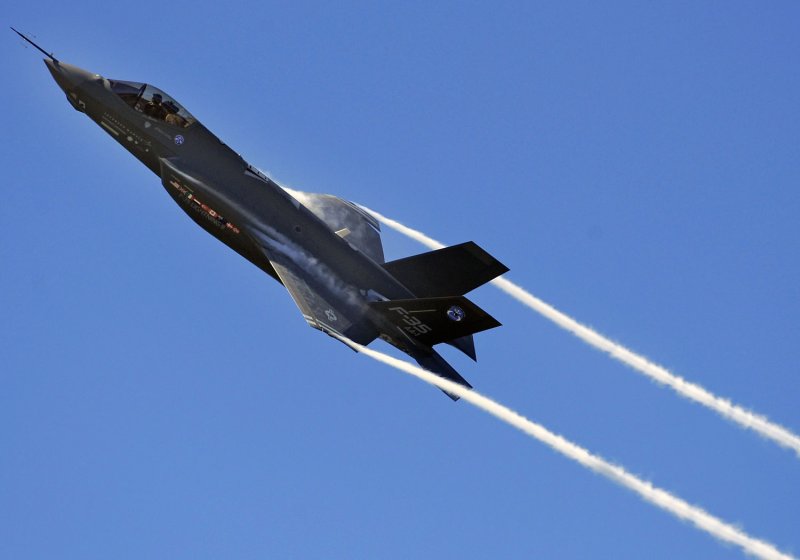An F-35 Lightning II Joint Strike Fighter test aircraft banks over the flightline at Eglin Air Force Base, Florida on, April 23, 2009. The aircraft is the first F-35 to visit the base which will be the future home of the JSF training facility. (UPI Photo/Julianne Showalter/US Air Force) |
License Photo
TEL AVIV, Israel, Jan. 31 (UPI) -- Israel seems determined to acquire a fleet of Lockheed Martin's costly F-35 stealth fighters despite the plethora of problems plaguing the development of the fifth-generation jet.
A new assessment of Israel's defense challenges indicates why: In the face of improving air defenses in Iran and Syria, Israel's main state adversaries in the Middle East, air superiority is vital in maintaining the Jewish state's qualitative military edge.
"Equipping the Israeli air force with the F-35 has strategic importance in terms of deterring the enemy from starting a war and in terms of maintaining Israel's qualitative advantage in the arena," the assessment observed.
The study, written by Gur Laish, an expert on the Israeli air force with the Institute for National Security Studies at Tel Aviv University, added that air superiority is essential for Israel if it is to be capable of striking "choice regions deep inside enemy territory."
Israel has threatened pre-emptive strikes against Iran's nuclear facilities if Tehran doesn't halt its alleged drive to develop nuclear weapons. All the sites are deep inside Iranian territory.
As for Syria, Iran's ally and the most implacable of Israel's Arab foes, the Israeli air force's main targets in the vent of renewed hostilities would be missile batteries capable of pounding key military targets and cities in Israel.
The Israelis demonstrated the potency of their air power on the night of Sept. 6, 2007, when a squadron of Boeing F-15I aircraft destroyed a nuclear plant the North Koreans were building for Syria at Deir al-Zour near the border with Iraq, after first electronically blinding Syrian air defenses.
However, the decision announced by Israeli Defense Minister Ehud Barak last August to buy the F-35 Lightning II has stirred debate, primarily over the cost and whether the jet will ensure Israel's air superiority over the next couple of decades.
Laish argues that Israel needs the F-35, the most advanced combat aircraft in the world, to strengthen the "element of deterrence, central in Israel's security concept" since it can deal with advanced air defenses and existing combat jets such as Russia's MiG-29 or the F-15s and Lockheed Martin F-16s in the inventories of Arab air forces.
The F-35's radar-evading capabilities, he went on, allows it to penetrate deep into enemy territory and attack heavily defended strategic targets.
Indeed, he observed, "the F-35 would be the central component of this capability."
Sometimes, he added, "Israel needs to be able to operate in enemy territory even in the absence of a wartime confrontation." Pre-emptive strikes against Iran's nuclear installations would fall under that category.
Syria and Iran have been building up their air defense capabilities, largely with Russian-made systems, which have eroded Israel's unquestioned superiority in the air, Laish noted.
He maintained that Israel's F-15I and F-16I aircraft, the backbone of its strategic air power, are aging and even the most extensive upgrades won't put them on the level of the F-35.
"An examination of alternatives in the form of surface-to-surface missiles and advanced unmanned aerial vehicles demonstrates that despite their expected contribution they cannot serve as complete substitutes to fifth generation fighter jets," Laish concluded.
However, Yiftah S. Shapir, a colleague of Laish's at the INSS, is more critical.
In a separate assessment, he acknowledged that while the jet has "some unique capabilities that would make every combat pilot's mouth water" -- stealth and the most advanced electronic systems in the world -- it "also has some very important shortcomings."
These, he said, include U.S. refusal of Israeli demands to install their own weapons and electronic systems and access to the aircraft's software codes.
Cost remains a problem. "The original price tag "was estimated at some $50 million-$60 million apiece but delays and overruns … pushed up the price," Shapir noted.
"The final price per unit is still unknown but it is estimated at $130 million-$150 million."
Development delays mean the earliest Israel could expect F-35 deliveries to begin would be 2016 -- well past the date Iran is expected to be able to produce nuclear weapons.
But Shapir concluded that Israeli companies' participation in the F-35 project and maintaining the strategic relationship with Washington "rule out examining other options, such as purchasing European aircraft (or even Russia's fifth-generation combat aircraft)."















